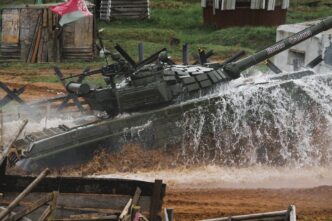Executive Summary
- Russia and Belarus began joint “Zapad-2025” war games, while NATO members like the UK, Denmark, France, and Germany are bolstering defenses on the eastern flank following multiple Russian drone incursions into Polish and Romanian airspace.
- The Kremlin accuses NATO of “de facto involvement” in the Ukraine conflict, coinciding with a large-scale Ukrainian drone attack targeting Russian territory, including an oil refinery.
- China strongly rejected a U.S. call for G7 and NATO countries to impose tariffs on Beijing for importing Russian oil, labeling it “unilateral bullying” and threatening countermeasures.
The Story So Far
- The current escalation, marked by the “Zapad-2025” war games and Russian drone incursions into NATO airspace, stems from the ongoing conflict in Ukraine and the Kremlin’s assertion that NATO is “de facto involved” in fighting Russia through its direct and indirect support for Kyiv. This military posturing and activity on NATO’s eastern flank is further complicated by broader geopolitical tensions, as evidenced by China’s strong rejection of U.S. calls for tariffs on nations importing Russian oil, highlighting a deepening confrontation on multiple fronts.
Why This Matters
- The initiation of joint Russian-Belarusian war games and repeated Russian airspace violations over NATO territory, alongside Ukraine’s retaliatory drone attacks, signifies a dangerous escalation of military tensions in Eastern Europe, prompting NATO members to bolster defenses and increasing the risk of miscalculation. This complex situation is further complicated by China’s strong rejection of U.S. pressure regarding Russian oil imports, indicating a broadening geopolitical entanglement that could reshape global economic and security alliances.
Who Thinks What?
- Russia and Belarus are initiating joint military exercises and the Kremlin accuses NATO of being “de facto involved” and “fighting against Russia” in the Ukraine conflict.
- NATO member countries, including the UK, Denmark, France, and Germany, are bolstering defenses along the eastern flank in response to Russian drone incursions into Polish and Romanian airspace.
- China’s Foreign Ministry strongly condemns the U.S. call for G7 and NATO countries to impose tariffs on Beijing for importing Russian oil, describing it as “unilateral bullying” and “economic coercion,” while asserting its right to normal economic cooperation with Russia.
Tensions in Eastern Europe have escalated significantly, with Russia and Belarus initiating joint “Zapad-2025” war games on Friday amid heightened friction with NATO, just days after Russian drones entered Polish airspace. NATO member countries, including the UK, Denmark, France, and Germany, are bolstering defenses along the eastern flank following multiple drone incursions into Polish and Romanian airspace. Concurrently, Ukraine launched a large-scale drone attack on Russian territory, while China pushed back against a U.S. call for G7 and NATO countries to impose tariffs on Beijing for importing Russian oil, signaling a broadening geopolitical entanglement.
Escalating Tensions on NATO’s Border
The “Zapad-2025” exercises began at training grounds across Russia and Belarus, with U.S. military officers observing the drills. Belarusian Defence Minister Viktor Khrenin reportedly extended an invitation for observers to examine “whatever is of interest for you” during the maneuvers.
These war games coincide with increased aerial activity in the region. Last week, more than a dozen Russian drones entered Polish airspace, prompting Poland to shoot them down. A Russian drone also reportedly flew through Romanian airspace on Sunday, marking the second such incursion over a NATO country in less than a week.
In response to these incidents, the UK announced that Royal Air Force Typhoons would join allied forces from Denmark, France, and Germany to strengthen NATO’s defense and deterrence capabilities. These jets are slated to conduct missions over Poland in the coming days.
Kremlin’s Accusations and Ukraine’s Offensive
The Kremlin has asserted that NATO is “de facto involved” in the conflict in Ukraine, claiming the alliance is “fighting against Russia” by providing direct and indirect support to Kyiv. Kremlin spokesman Dmitry Peskov reiterated this stance, stating it could be said “with absolute certainty” that NATO is engaged in combat against Russia.
Meanwhile, Ukraine launched a substantial drone attack overnight Sunday, reportedly deploying at least 361 drones targeting Russia. Russian officials confirmed a brief fire at the Kirishi oil refinery in Russia’s northwest, though no injuries were reported. Russia’s defense ministry stated that its air defense systems intercepted 361 drones, four guided aerial bombs, and a U.S.-made HIMARS missile.
China’s Stance Amid U.S. Pressure
On the economic front, China strongly condemned a U.S. call for G7 and NATO countries to impose tariffs on Beijing and other nations importing Russian oil. China’s Foreign Ministry spokesperson Lin Jian described the U.S. push as a “typical act of unilateral bullying” and “economic coercion,” threatening countermeasures if Washington’s call is heeded.
Lin Jian emphasized that China’s “normal economic and energy cooperation with countries around the world, including Russia, is legitimate, lawful, and above reproach.” This strong rejection came as Chinese and U.S. delegations reconvened in Spain for the second day of talks on economic and trade issues, highlighting the complex interplay of geopolitical and economic dynamics.
Geopolitical Entanglements
The convergence of military exercises, airspace violations, and geopolitical accusations underscores a period of heightened tension across Eastern Europe. With NATO countries reinforcing their defenses and Russia asserting direct engagement from the alliance, the situation reflects a deepening confrontation, further complicated by the U.S. and China’s roles in the economic and diplomatic spheres.








